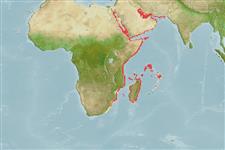Preferred temperature (Ref.
115969): 24.8 - 29.3, mean 27.2 (based on 238 cells).
Phylogenetic diversity index (Ref.
82804): PD
50 = 0.5001 [Uniqueness, from 0.5 = low to 2.0 = high].
Bayesian length-weight: a=0.03090 (0.01711 - 0.05582), b=2.89 (2.74 - 3.04), in cm Total Length, based on LWR estimates for this species & Genus-body shape (Ref.
93245).
Nível Trófico (Ref.
69278): 2.5 ±0.00 se; based on food items.
Resiliência (Ref.
120179): Muito baixo, tempo mínimo de duplicação da população maior que 14 anos (Preliminary K or Fecundity.).
Prior r = 0.28, 95% CL = 0.16 - 0.49, Based on 2 stock assessments.
Fishing Vulnerability (Ref.
59153): High to very high vulnerability (69 of 100).
Climate Vulnerability (Ref.
125649): Very high vulnerability (85 of 100).
